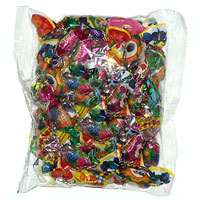Улыбка (часть первая)
The Russian noun for “a smile” is улыбка, and the verb is улыбаться/улыбнуться.
| У неё такая красивая улыбка! | She has such a pretty smile! |
| Я не поверил своим глазам: сегодня Зоя улыбнулась мне! | I couldn't believe my eyes: Zoya smiled at me today! |
| Почему американцы постоянно улыбаются? | Why do Americans constantly smile? |
In Russia smiling is not required to be polite. A store clerk can walk up to you, look you in the eye, and not say a thing. If you ask her for something and she gives it to you without a word, then she has been perfectly polite: you got what you wanted without a hassle. This lack of smiling creates a very bad impression on Americans who go to Russia; they come away with the feeling that everyone in the country is rude. They are wrong. It's simply a different social standard. Russians smile when they are happy, and I don't mean happy in the sense of "Oh, here comes my 78th customer of the day, what a joy, I'll smile because I'm really interested in him as a human being!" That's an American delusion. Russians smile when they are actually happy. A Russian man smiles when he hasn't seen his girlfriend in three weeks and she shows up at the door, flings herself into his arms and offers to make dinner. A Russian woman smiles when she finds three hundred dollars on the ground and no one else is around so she gets to keep it. That's what smiling is about in Russia: actual specific happiness. It's never smiling just to be polite.

The Russians label the American smile as «дежурная улыбка» “a business smile,” the kind of smile you put on your face just because that's what Americans are in the habit of doing. That kind of smiling creates an impression of insincerity and falsehood in the Russian mind and makes people wonder, "What the heck is so-and-so up to?” There's a story of an American business coach teaching the employees of a Russian company to constantly smile at each other and say, “Have a nice day.” Three weeks after the consultant left, everyone in the office thought everyone else was out to get them. The American smiles caused mutual suspicion, a sense of falsehood; it was completely the wrong thing to teach a company in a Russian environment.
It's funny: we Americans tend to think that our smiles are a spontaneous expression that springs simply from emotion. Not so. A smile is a learned behavior which is used to mean different things in different places. I remember back in the 2001 World Series there was a game where Byung-Hyun Kim made a series of bad pitches that could have lost the game. He stood in the middle of the field staring at the ground and grinning like an idiot. The American audience totally misunderstood his smile. Some thought he was being overconfident. Some thought he was thinking it just didn't matter. But Koreans may use a smile to mask negative feelings, and in this case the feeling was shame. The guy wasn't overconfident. He wasn't making light of the situation. He was feeling like a complete failure and was thinking about how his wife and all his friends and countrymen would be ashamed of him.
The lesson to draw is this: when we first go to Russia, our American intuition will tell us that the Russians are always being rude. That intuition is false. You will have to train yourself to remember that those intuitions you have are based on American expectations of body language. Russian body language is different. Use your mind to teach your emotions how to reinterpret things.
You can find an interesting article about Russian and American smiles here. The section contrasting how Russians and Americans smile at children and pets strikes me as being slightly exagerrated, but on the whole I think there is some truth there.
PS. On October 21st, 2008 Russian singing duo «Тату» (t.A.T.u. in English releases) released a new album called «Весёлые улыбки» "Happy Smiles."
2013-12-06: I just came across another neat article on Russian smiles at Russia Beyond the Headlines (mirror). You can find the original of the article at adeptis.ru (mirror).
2014-01-09: A former student of mine, Graeme Fox, pointed out this new addition (mirror) to the discussion of Russian smiles. Point #11 is quite good; I had never thought of that aspect.
Квас

Квас is a very popular Russian drink. It is a mildly fermented alcoholic beverage made from rye bread or berries and yeast. Because this drink has very low alcohol content (1%), it is considered acceptable for children to drink. It is often flavored with fruits фрукты and herbs травы such as strawberries клубника and mint мята. This drink can be bought at the store or made at home. As a child, I loved drinking квас and my mother was a professional at making this drink.
I remember an unfortunate day when I tried to help my mom make квас. I wanted my mom to see that I could be a very good helper so I decided to prove this. I came up to my mom and asked her «Mама, можно я помогу тебе сделать квас?» “Mama, can I help you make квас?” My mother smiled at me and said «Конечно, моя дорогая!» “Of course, my dear!” I tried to show my mom that I was a big girl and could handle carrying one of the large jars of liquid to the table. While my mother left the kitchen, I quickly tried to move the heavy jar and to my surprise, the jar slipped out of my hands and fell to the floor. I was shocked and scared so I ran to my mother in a panic and as I ran, I saw her frantically run towards me! She said, «Что случилось?» “What happened?” In a panicked voice I answered «Я хотела передвинуть банку с квасом, но она упала и разбилась!» “I wanted to move the jar of квас, but it fell and shattered!”. My mom was upset with me for the rest of that day, but from then on I understood that I should not take on tasks that I can not handle.
Конфеты (часть первая)

The Russian word for candy is конфеты. Russians love to serve candy with tea when guests come over, and many candies are wrapped in very beautiful wrappers that make the table cheerful. A common ingredient in Russian candy is chocolate шоколад and waffles вафли, but of course a wide range of other candy ingredients also exists in Russia.
Each year here in the States my little sister enjoys collecting candy on Halloween and tries to break the record each year by collecting more candy than last year. «В этом году я насобираю больше конфет, чем в прошлом году!» “This year I will collect more candy than last year!” I enjoy walking around with her and looking at all the decorated houses. This year after we came home, my sister counted all of her candy and said «Класс! В этом году я насобирала тысячу двести три конфеты!» “Cool! This year I collected one thousand two hundred and three pieces of candy.”

Don's additional notes: the singular of конфеты is конфета “a piece of candy.” One type of candy in Russia is called ириска, which is a caramel that resembles one of the mini Tootsie Rolls one hands out at Halloween. Which reminds me of a joke:
| В магазин входит старушка и просит одну ириску. | An old woman walks into a store and asks for one caramel. |
| Продавец: Только одну? Почему так мало? | Salesman: Just one? Why so few? |
| Старушка: Ну, гулять так гулять. Дайте две ириски! | Old woman: What the heck, may as well party hardy. Give me two caramels! |
(Source of joke: "Russian Stage Two: Welcome Back!" (textbook) © 2001 by American Council of Teachers of Russian)
Корабль
The Russian word for ship is корабль. When I was a little girl, I always wanted to take a ride on a ship because I loved the ocean. My dream finally came true when my uncle rented a ship and we went sailing in the Black Sea. My mom surprised me when she said «На следующей неделе мы все поедем кататься на корабле!» “Next week all of us will go for a ride on а ship!” All week I worked hard on packing my bags though we were only going for one day. I brought everything with me even though my mom constantly told me «Оля, ты слишком много берешь вещей» “Olga, you are bringing too many things.”
Next week, we woke up early in the morning to get ready for the exciting day. I remember that it was very windy that day and my excitement grew even more because I knew there would be big waves. Once we were sailing on the ship, I pulled out my chair and sat down with a blanket and a cup of tea. With the cool breeze running through my hair, I said «Сегодня море очень красивое, потому что волны большие» “Today the ocean is very beautiful because the waves are big.” As I sat, I thought I noticed a dolphin and I jumped out of my seat and yelled «Смотрите! Я вижу дельфина!» “Look! I see a dolphin.” It turned out that what I thought was a dolphin was actually just a large fish. I was disappointed, but I still had a relaxing time while I watched the beautiful waves.
Кукла
The Russian word for doll is кукла, as in «Куклы лежат на кровати» “The dolls are lying on the bed.” Many small Russian girls enjoy collecting dolls and placing them out on their beds as decorations. Both I and my sister had a collection of dolls that we enjoyed playing with while we lived in Russia. Each year on our birthday my parents bought a new doll for us. «У меня было восемь кукол, а у моей сестры было двенадцать» “I had eight dolls and my sister had twelve.” Of course once we received our new dolls, we took them with us to the park and showed them off to all the other children. At the park I always thought that my doll was the most beautiful of all so I said «Моя кукла красивей твоей!» “My doll is prettier than yours!” The other girls tried to prove the same.
I remember meeting a very mean girl at the park. When I began arguing with her about whose doll was prettier, she yanked my doll out of my hands and tore its head off. I was so upset that I grabbed her by the hair and started fighting with her while screaming «Дура! Ты убила мою куклу!» “Stupid! You killed my doll!” My mom ran over to us and yelled «Перeстаньте драться!» “Stop fighting!” as she tried to pull us apart from each other. I went home and cried all day because my new birthday dolly was broken. Luckily my parents were able to repair it and the next day, they came to me and said «Сюрприз! Мы отремонтировали твою куклу!» “Surprise! We fixed your doll!”
Don's additional notes: красивей is an alternative form for the more common красивее.
<< 1 ... 141 142 143 ...144 ...145 146 147 ...148 ...149 150 151 ... 158 >>